By: Timothy S. Rich, Katrina Fjeld, Aurora Speltz, and Kerby Gilstrap
Timothy S Rich is a professor of political science at Western Kentucky University and director of the International Public Opinion Lab (IPOL).
Katrina Fjeld is an honors undergraduate researcher at Western Kentucky University majoring in international affairs and Arabic.
Aurora Speltz is an honors undergraduate researcher at Western Kentucky University majoring in international affairs, Arabic, and Spanish.
Kerby Gilstrap is a recent alumna of Western Kentucky University, where she studied international affairs, Arabic, and sustainable development.
Funding for this survey was provided by the Mahurin Honors College at Western Kentucky University.
The United States supports maintaining peace and stability across the Taiwan Strait, and opposes any unilateral changes to the status quo. Yet, China’s military modernization threatens the continuation of this tenuous balance, making American military sales to Taiwan—totaling over USD $15 billion in armaments since 2010—crucial to the country’s defense. However, continued arms sales and support for Taiwan have heightened tensions with China, and “harms peace and stability” according to China’s Taiwan Affairs Office (TAO, 國務院台灣事務辦公室). This is despite the fact that China has “made no promise to renounce the use of force” in its quest for unification. Selling Taiwan military equipment, while helpful, may not be enough to deter China, as Taiwan realistically cannot afford to the buy the quantity of “traditional” weaponry necessary. Failure to respond may risk American interests in the region and boost Chinese efforts at regional hegemony.
Most experts assume that the United States would respond to any attempt at an invasion. Furthermore, President Biden recently pledged to defend Taiwan, even as the administration continues to pay lip service to a policy of strategic ambiguity. Likewise, any effort by the United States would also incur significant political and economic costs, likely limiting efforts to go “all in” on Taiwan’s defense or to end strategic ambiguity, despite calls to do so. Left out of this is a discussion of the degree to which the American public is supportive of defending Taiwan.
Any military assault on Taiwan would be politically and militarily costly for China—and despite public denials, Chinese officials have likely seen potential parallels to Russia’s military hubris in the early days of its invasion of Ukraine. Meanwhile, polls conflict in regards to Taiwanese willingness to fight China, and a recent survey suggests most Taiwanese do not pay much attention to China. Post-Ukraine invasion surveys of international relations experts conducted by William & Mary’s Global Research Institute have found that, despite common assumptions that the invasion of Ukraine would lead China to instigate conflict, 46.2 percent of respondents indicated that Chinese use of force against Taiwan was “no more or less likely” in the coming year—with 34.15 percent believing that it was actually less likely to occur. That said, several factors—including China’s increased military capabilities, frequent military drills in the vicinity of Taiwan, the start of Xi Jinping’s (習近平) third term, and the possibility of another Democratic Progressive Party (DPP, 民進黨) president elected in 2024—could create conditions that incentivize Chinese aggression.
Furthermore, Taiwanese may be overly optimistic about the United States’ willingness to intervene on their behalf. A 2020 Chinese Association of Public Opinion Research (CAPOR, 中華民意研究協會民調) poll found that 58.7 percent believed the US would send troops to aid Taiwan; while a 2022 Taiwanese Public Opinion Foundation (TPOF, 台灣民意基金會) poll found 53.8 percent believed the same, nearly doubling from their October 2021 poll. This could be in part because of President Biden’s statement in late May 2022 that the United States would aid Taiwan in the case of a Chinese invasion. However, given the tepid US response to Russia’s invasion of Ukraine, overconfidence in US assistance may lead the Taiwanese government to forego the painful, but necessary, domestic military reforms that may be necessary to fend off an attack.
Recent Historical Public Opinion Polling on US Support for Taiwan
Research has shown that the American public is increasingly wary of military interventions, even as limited survey data has shed some light on US public support for Taiwan. An inward turn is evident in several polls, including a 2017 Pew Research Center poll that indicated 57 percent of Americans wanted the United States to prioritize its own issues over world intervention. This shift on global intervention leaves future support for Taiwan ambiguous. For example, a 2019 Chicago Council on Global Affairs poll found that 61 percent of Americans were against arms sales to Taiwan, while other survey work in 2020 found a more ambivalent public, with roughly 20 percent opposed to continued sales, though public support for arms sales slightly increased when framed as potentially harming relations with China. A YouGov poll in 2017 found that 44 percent of Americans viewed Taiwan as friendly, but only 13 percent viewed it as an ally. In a similar display of American uncertainty, a 2018 Pew Research Center survey determined that 41 percent of Americans were somewhat concerned about tensions between Taiwan and China, down from 44 percent the year prior. Meanwhile, a 2021 Chicago Council survey found that a narrow majority—52 percent—were supportive of using US troops to defend Taiwan, the first time support had reached such levels.
One of the issues with previous surveys is that it can be very difficult to parse out the factors influencing views of Taiwan. After all, many Americans know little about Taiwan. Rather than responding based on an affinity for Taiwan, respondents claiming support for defending Taiwan may be motivated more by animosities towards China. Views of China have increasingly soured in recent years, especially due to the COVID-19 pandemic and trade war rhetoric under President Trump, while issues such as human rights abuses and intellectual property theft have received increased attention. This growing distrust of China was well illustrated by a 2021 Pew survey, which found a desire for the United States to be tougher on economic issues and human rights with China; as well as a 2022 Pew survey that found that 82 percent of respondents held an unfavorable view of China. Likewise, a 2021 Gallup study found that the percentage of Americans viewing China as the country’s greatest enemy had increased to 45 percent, more than doubling since the previous year. Such views of China are exacerbated by misconceptions—including the belief that China has the world’s strongest economy, a belief held by roughly half of Americans.
In addition, broader public views on US involvement in international affairs would presumably influence a willingness to defend Taiwan. A public increasingly wary of international involvement may shy away from all efforts to defend fellow democracies, which could then appear as a decline in support for Taiwan. For example, a 2019 Pew survey found a partisan divide, with 62 percent Democrats but only 45 percent of Republicans stating that “it’s best for the future of our country to be active in world affairs.” Fatigue from previous military engagements in Iraq and Afghanistan may also make the public hesitant to support future conflicts that may not see a quick end.
New Public Opinion Polling Conducted in Summer 2022
To address US perceptions of issues related to defending Taiwan, we conducted an original national web survey in the United States from June 29-July 11 via Qualtrics, with quota sampling for age, gender, and geographic region. We asked 1,728 Americans the question: “Do you favor or oppose the US defending Taiwan if it were attacked by China?” Overall, clear majorities state that the US should defend Taiwan (61.23 percent), with higher rates among Democrats than Republicans (67.04 percent vs. 60.15 percent). A majority of those without a party identification also favored defending Taiwan (54.34 percent).
Additional questions add greater insight. Before being asked about defending Taiwan, respondents were asked, “Which of the following best describes your view of the US role in world affairs?” Two potential answers could be selected:
- “We should pay less attention to problems overseas and concentrate on problems at home;” or
- “It’s best for the future of our country to be active in world affairs.”
Here, 56.29 percent of Democrats, but only 32.66 percent of Republicans and 40.31 percent of independents, chose the latter option. However, the overwhelming majority of those who stated that the US should be active in world affairs—72.99 percent—supported defending Taiwan. Surprisingly, even a slight majority—51.77 percent—of those stating that the US should concentrate on problems at home also supported Taiwan’s defense.
We also asked respondents to rate both China and Taiwan on a 1-10 scale, with 1 being very negative and 10 very positive. Overall, China averaged a 4.01 and Taiwan a 6.06, with lower China evaluations among Republicans (3.53) versus Democrats, and higher Taiwan evaluations among Democrats (6.40) versus Republicans (6.04). Unsurprisingly, those who rated China more negatively and Taiwan more positively were more supportive of the United States coming to Taiwan’s defense.
Lastly, regression analysis found that after controlling for gender, age, income, and education, the largest single factor influencing support for Taiwan’s defense was a belief that the United States should be active in world affairs—though party affiliation and opinion towards China and Taiwan all remained statistically significant in the expected directions. In addition, women were less supportive of defending Taiwan, while higher levels of education positively corresponded with support.
The results suggest a general willingness to see the United States defend Taiwan, at least in the abstract, which should aid efforts to not only continue arms sales but also build substantive relations between the two countries. However, such support likely remains predicated on factors often ignored in the absence of an immediate threat of invasion. Research commonly finds that the American public is strongly influenced by American casualties, although this can be shaped by leadership and framing by policy elites. If the public estimates heavy American casualties, this may decrease support for Taiwan. Moreover, a public supportive of defending Taiwan may lower the domestic political costs of coming to Taiwan’s aid, but it does not mean necessarily that the United States has the capabilities to defend Taiwan.
The main point: New public opinion polling of US attitudes towards the defense of Taiwan shows majority support for defending Taiwan, with this support strongest amongst those who believe in an active role for the United States in world affairs.





